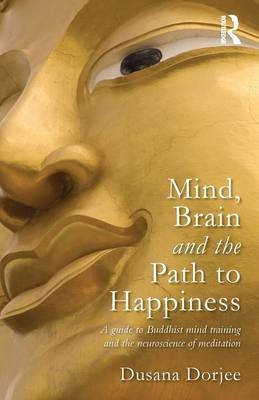
Mind, Brain and the Path to Happiness
A GUIDE TO BUDDHIST MIND TRAINING AND THE NEUROSCIENCE OF MEDITATION
Seiten
2013
Routledge (Verlag)
978-0-415-62614-9 (ISBN)
Routledge (Verlag)
978-0-415-62614-9 (ISBN)
Dorjee presents a contemporary account of Buddhist mind training and the pursuit of happiness in relation to psychology and neuroscience.
Mind, Brain and the Path to Happiness presents a contemporary account of traditional Buddhist mind training and the pursuit of wellbeing and happiness in the context of the latest research in psychology and the neuroscience of meditation.
Following the Tibetan Buddhist tradition of Dzogchen, the book guides the reader through the gradual steps in transformation of the practitioner’s mind and brain on the path to advanced states of balance, genuine happiness and wellbeing. Dusana Dorjee explains how the mind training is grounded in philosophical and experiential exploration of the notions of happiness and human potential, and how it refines attention skills and cultivates emotional balance in training of mindfulness, meta-awareness and development of healthy emotions. The book outlines how the practitioner can explore subtle aspects of conscious experience in order to recognize the nature of the mind and reality. At each of the steps on the path the book provides novel insights into similarities and differences between Buddhist accounts and current psychological and neuroscientific theories and evidence. Throughout the book the author skilfully combines Buddhist psychology and Western scientific research with examples of meditation practices, highlighting the ultimately practical nature of Buddhist mind training.
Mind, Brain and the Path to Happiness is an important book for health professionals and educators who teach or apply mindfulness and meditation-based techniques in their work, as well as for researchers and students investigating these techniques both in a clinical context and in the emerging field of contemplative science.
Mind, Brain and the Path to Happiness presents a contemporary account of traditional Buddhist mind training and the pursuit of wellbeing and happiness in the context of the latest research in psychology and the neuroscience of meditation.
Following the Tibetan Buddhist tradition of Dzogchen, the book guides the reader through the gradual steps in transformation of the practitioner’s mind and brain on the path to advanced states of balance, genuine happiness and wellbeing. Dusana Dorjee explains how the mind training is grounded in philosophical and experiential exploration of the notions of happiness and human potential, and how it refines attention skills and cultivates emotional balance in training of mindfulness, meta-awareness and development of healthy emotions. The book outlines how the practitioner can explore subtle aspects of conscious experience in order to recognize the nature of the mind and reality. At each of the steps on the path the book provides novel insights into similarities and differences between Buddhist accounts and current psychological and neuroscientific theories and evidence. Throughout the book the author skilfully combines Buddhist psychology and Western scientific research with examples of meditation practices, highlighting the ultimately practical nature of Buddhist mind training.
Mind, Brain and the Path to Happiness is an important book for health professionals and educators who teach or apply mindfulness and meditation-based techniques in their work, as well as for researchers and students investigating these techniques both in a clinical context and in the emerging field of contemplative science.
Dusana Dorjee, PhD, is a cognitive neuroscientist, lecturer and research lead at the Centre for Mindfulness Research and Practice in the School of Psychology at Bangor University. Her research investigates how meditation, particularly mindfulness, enhances well-being and modifies the mind and brain. Dusana is also a long-term meditation practitioner and teacher in the Tibetan Buddhist tradition of Dzogchen.
Acknowledgements. Preface. Introduction. Chapter One: Kinds of Happiness. Chapter Two: Intention, Human Potential and Dzogchen. Chapter Three: Attention Training. Chapter Four: Emotional Balance. Chapter Five: Exploring Consciousness. Chapter Six: Implications for the Science of Meditation and the Practitioner. Bibliography. Glossary.
| Verlagsort | London |
|---|---|
| Sprache | englisch |
| Maße | 138 x 216 mm |
| Gewicht | 310 g |
| Themenwelt | Geisteswissenschaften ► Religion / Theologie ► Buddhismus |
| Medizin / Pharmazie ► Medizinische Fachgebiete ► Psychiatrie / Psychotherapie | |
| Naturwissenschaften ► Biologie ► Humanbiologie | |
| Naturwissenschaften ► Biologie ► Zoologie | |
| Sozialwissenschaften ► Soziologie | |
| ISBN-10 | 0-415-62614-5 / 0415626145 |
| ISBN-13 | 978-0-415-62614-9 / 9780415626149 |
| Zustand | Neuware |
| Haben Sie eine Frage zum Produkt? |
Mehr entdecken
aus dem Bereich
aus dem Bereich
Philosophische Betrachtungen
Buch | Softcover (2024)
Aufbau TB (Verlag)
12,00 €
Unterweisungen in Zen-Meditation
Buch | Hardcover (2024)
Arkana (Verlag)
20,00 €


